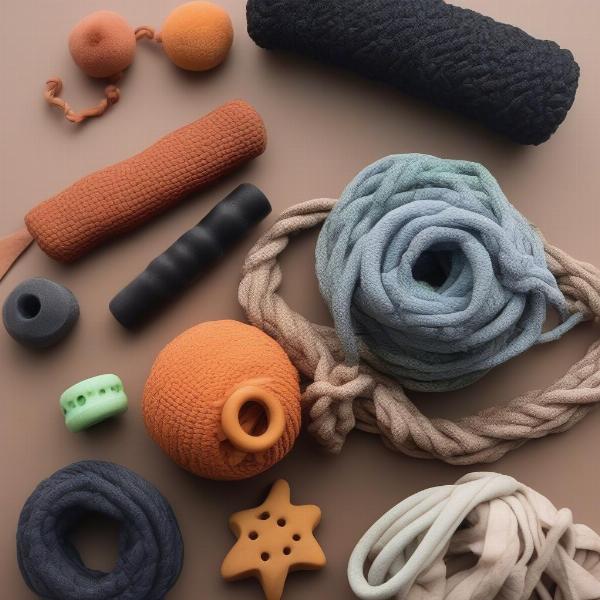Chewable dog toys are essential for a dog’s physical and mental well-being. They help satisfy a dog’s natural instinct to chew, keeping them entertained, reducing anxiety, and promoting dental health. This guide will explore everything you need to know about chewable dog toys, from choosing the right type to ensuring safe and enjoyable chewing experiences for your furry friend.
Choosing the Right Chewable Dog Toy
Selecting the appropriate chew toy depends on several factors, including your dog’s age, size, breed, and chewing habits. A tiny chihuahua will have different needs than a large German Shepherd. Consider the following:
-
Puppy Toys: Puppies need soft, pliable toys designed for their developing teeth. Avoid hard toys that could damage their gums. Look for toys made of natural rubber or soft plush materials.
-
Adult Dog Toys: Adult dogs can handle a wider variety of textures and materials. Durable rubber toys, nylon bones, and rope toys are popular choices.
-
Senior Dog Toys: Older dogs may have weaker teeth and gums. Choose softer chew toys made from natural rubber or those designed specifically for senior dogs.
-
Aggressive Chewers: For dogs who love to power through toys, opt for extra-durable options made from tough materials like nylon or hard rubber. Look for toys labeled as “indestructible” or “heavy-duty.”
Materials and Safety
Always prioritize safety when choosing chewable dog toys. Look for non-toxic materials that are free of harmful chemicals. Avoid toys made with small parts that could be swallowed or pose a choking hazard.
-
Natural Rubber: A popular and durable choice, natural rubber is generally safe and long-lasting.
-
Nylon: Nylon bones are extremely durable and can withstand aggressive chewing. However, ensure they are made from high-quality nylon and not prone to splintering.
-
Rope Toys: Rope toys are great for playing tug-of-war and satisfying the chewing instinct. Choose toys made from tightly woven, durable rope.
-
Plush Toys: While not as durable as rubber or nylon, plush toys can be comforting for some dogs. Ensure they are well-made and don’t contain squeakers or stuffing that could be ingested.
 Safe Chew Toy Materials
Safe Chew Toy Materials
Benefits of Chewable Dog Toys
Chewing is a natural behavior for dogs, and providing appropriate chew toys offers numerous benefits:
-
Dental Health: Chewing helps remove plaque and tartar buildup, promoting healthy teeth and gums.
-
Mental Stimulation: Chew toys keep dogs entertained and mentally stimulated, reducing boredom and preventing destructive behaviors.
-
Stress Relief: Chewing can be a calming activity for dogs, helping to relieve stress and anxiety.
-
Jaw Exercise: Chewing strengthens jaw muscles and promotes overall oral health.
Keeping Chew Time Safe
While chew toys are beneficial, it’s crucial to supervise your dog during playtime. Regularly inspect toys for damage and discard any that are worn or broken. Choose toys that are appropriately sized for your dog to prevent swallowing or choking hazards.
Conclusion
Chewable dog toys are a vital part of a dog’s overall well-being. By carefully selecting the right type of toy and prioritizing safety, you can provide your furry friend with hours of enjoyment and promote their physical and mental health. Remember to consider your dog’s age, size, and chewing habits when choosing a toy, and always supervise them during playtime.
FAQ
-
What are the best chew toys for aggressive chewers? Durable nylon or hard rubber toys labeled as “indestructible” are good choices for aggressive chewers.
-
Are rawhide chews safe for dogs? Rawhide can pose choking and digestive risks. Consider safer alternatives like natural rubber or nylon chews.
-
How often should I replace my dog’s chew toys? Replace any toy that is worn, broken, or poses a choking hazard.
-
Can chew toys help with teething puppies? Yes, soft, pliable chew toys can soothe teething puppies and help with jaw development.
-
What if my dog swallows a piece of a chew toy? Contact your veterinarian immediately if your dog swallows a piece of a chew toy.
-
Are there any chew toys that can help clean my dog’s teeth? Yes, some chew toys are designed with textures and materials that help scrape away plaque and tartar.
-
Can I give my dog bones as chew toys? Cooked bones should never be given to dogs as they can splinter and cause internal injuries. Some raw bones can be appropriate, but always supervise your dog and consult with your veterinarian.
Related Articles:
About ILM Dog:
ILM Dog is your trusted resource for all things dog-related. From breed selection and healthcare to training, nutrition, and grooming, we provide expert guidance and practical advice to help you care for your canine companion. Whether you’re a new dog owner or a seasoned pro, we offer a wealth of information to help you navigate every stage of your dog’s life. Contact us at [email protected] or +44 20-3965-8624 for personalized advice and support.